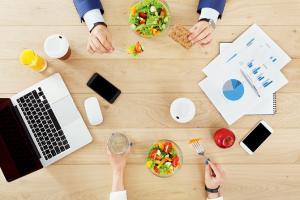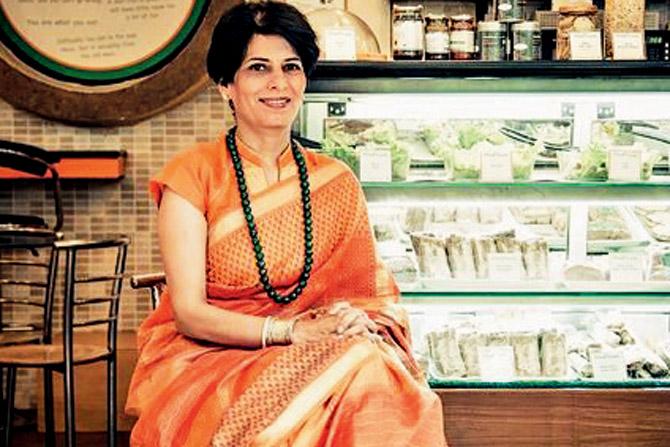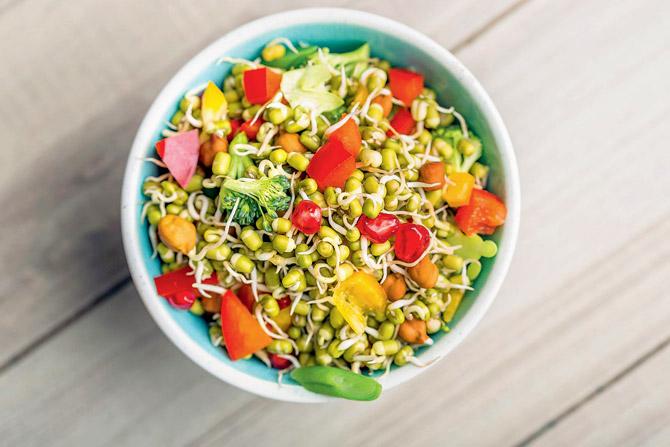With a major chunk of our waking hours spent in office, a clinical nutritionist whittles down her experience to pen a smart-eating guide, tailored for different professions

An early morning call with an Australian client. A post-lunch presentation that still needs work. A colleague's birthday treat. A team dinner to celebrate a new project. Tweak these scenarios with occupation-specific exigencies, but the ultimate casualty remains the same — your nutrition. Food is what you skip for a crazy deadline; it is what you turn to when a castigating mail pops up in the inbox; its unhealthiest form is what you munch on when the day doesn't seem to end; and it's what you raise a toast with when things look up.
'Considering that employees spend the better part of their day… at work, the workplace represents a logical place to ensure proper nutrition,' writes clinical nutritionist, consultant and columnist Ishi Khosla in the book, Eating at Work: Make Food Work for You (Simon & Schuster India), with her co-author, content writer and journalist Nina Mehta. And yet, when it comes to giving nutrition its due at the workplace, logic takes a backseat, for the consequences of not eating right are more insidious than obvious.
ADVERTISEMENT

'Years of senseless and thoughtless eating leads to hair fall, skin disorders, digestive issues, heartburn, constipation, stress, anxiety, a foggy mind, mood swings, attention deficit disorders, depression, polycystic ovaries, etc. These are a precursor to obesity, high blood pressure, pre-diabetes, abnormal cholesterol levels, and even autoimmune disorders,' Khosla elucidates, while acknowledging that ensuring a balanced diet at the workplace is also a prerogative of the employer.
That said, there is much that can be done at an individual level. "Most of my clients would complain that they found it difficult to adhere to healthy eating habits in office. As a professional, it was a no-brainer for me that good nutrition requires some amount of planning and tweaks in one's lifestyle. But it was when I dug deeper into the reasons for why people don't eat healthy at work, I realised that though some factors remain constant, each profession comes with own set of challenges," says Khosla.
But before the book goes on to address them, it lists what it calls common workplace disasters.
'You are what you eat'
And what you don't. With easy access to healthy-eating content through self-help books and social media, you are already aware of what happens when you skip breakfast. It finds a place of pride among the disasters listed in the book, too, but Khosla acknowledges the fact that some people might just not feel hungry enough to eat in the morning, and for them, she recommends light snacks including sprouts, nuts, fruits, vegetables, milk or smoothies.
The book also advises office goers against dashboard and desktop dining — or eating while commuting and before the computer — and keeping aside 15 minutes to eat mindfully, which helps one feel more satiated and for longer.
While you know that you need to watch your caffeine and sugar intake like a hawk, here's some bad news. Green tea in excess can also cause gastritis or irritation in the gut. Plain, fruit- or vegetable-infused water, buttermilk and vegetable juices are some of your options.

In her practice, Khosla has come across several clients who have admitted to being able to pull off eating healthy until lunchtime, but all hell breaks loose between 5 pm and 7 pm, when hunger is at peak. She calls these the devil hours and the strategy to combat this tempting time — which is also when most office celebrations take place — forms a significant part of the book.
Take charge

During the devil hours, Khosla writes, 'it is advisable to eat a meal at this time and eat a lighter meal or healthy snack later. Aim to eat cereals/grains, sandwiches, rotis, idlis, etc. and then go home and have vegetables, soups, salad, fruits or some protein-rich food.' In fact, going easy with grains and eating more of fruits and vegetables (cooked and raw) has been strongly emphasised in the book. The rationale being that while grains — rice, wheat and millets in India — were rightly consumed as a big chunk of the meal by previous generations, our sedentary lifestyle calls for them to be treated as side dishes. Fruits and vegetables, instead, should be the main component of our meal to protect us against the unprecedented levels of toxins in our environment, followed by protein-rich foods (pulses, eggs, fish, poultry, meats, nuts, and dairy).
To ensure adherence to this new approach to food, Khosla lays down the 5P rule. She recommends "planning" your day nutritionally (just how you plan what you wear to work), by knowing your "peak hunger time", including "proteins" in at least two meals and "pairing proteins with vegetables" for best results, and dedicating one meal of the day to "protective foods" i.e. fruits and vegetables.
Easier said than done? Pick your profession and get your cues from these condensed pointers from the detailed plans in the book.
Corporate executives and bureaucrats
- Do not skip meals and avoid long gaps between two meals. Small meals with light snacks are better.
- Carry homemade food every day instead of eating cafeteria food.
- As far as possible, eat a light lunch. It will keep you energised and see you through longer.
- Snack smartly; avoid deep-fried fatty snacks and biscuits in meetings.
- Limit alcohol to no more than two small drinks on any particular day.
- Find an opportunity to take short brisk
- walks within your office complex intermittently during the day.
Night shifts/erratic or extended working hours
- Eat small frequent meals and eat your bigger meal during the day or before 8 pm.
- Avoid having high-carbohydrate snacks later in the day or at night.
- Undergo routine medical check-ups.
Bakers, chefs, restaurant owners
- Learn and practise portion control.
- Account for every bite that you taste as approximately 25 Kcal.
- Engage in regular physical activity.
- Address your food allergies/sensitivities.

Journalists and lawyers
- Breakfast or first meal should include fresh vegetable juices, fruits; protein in the form of eggs, sprouts and chillas.
- Smart snacks like nuts, chana, sprouts and fruits can be packed for your commute.
- Plan to eat most of your grain/ cereal or main meal between 5 pm and 7 pm.
- Practise weekly fasting or detox diets.
Catch up on all the latest Crime, National, International and Hatke news here. Also download the new mid-day Android and iOS apps to get latest updates
 Subscribe today by clicking the link and stay updated with the latest news!" Click here!
Subscribe today by clicking the link and stay updated with the latest news!" Click here!







